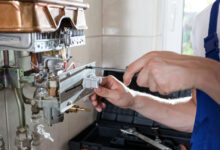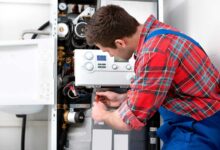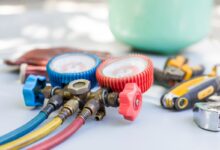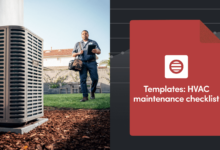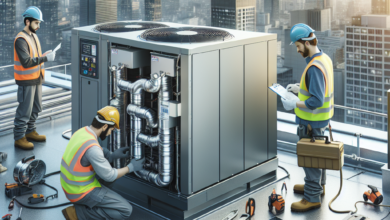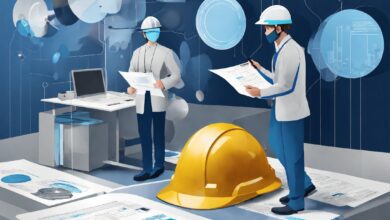Benefits of HVAC Maintenance
Benefits of HVAC Maintenance – Regular HVAC maintenance is crucial for the longevity, performance, and efficiency of your heating, ventilation, and air conditioning systems. Neglecting this essential aspect can lead to costly repairs, reduced comfort levels, and increased energy consumption. In this comprehensive blog article, we will explore the numerous benefits of HVAC maintenance, ranging from improved indoor air quality to lower energy bills. By understanding the importance of regular maintenance, you can make informed decisions and take proactive steps towards maintaining a comfortable and healthy living environment.
Enhanced Indoor Air Quality
A key benefit of HVAC maintenance is the significant improvement in indoor air quality. With regular maintenance, air filters are cleaned or replaced, debris is removed, and proper ventilation is ensured. These measures effectively eliminate dust particles, allergens, and pollutants from circulating in your home or office, resulting in cleaner and healthier air. By reducing the presence of these irritants, HVAC maintenance helps minimize respiratory issues, allergies, and asthma symptoms in individuals.
Clean and Efficient Air Filters
The air filters in your HVAC system play a crucial role in trapping dust, dirt, pollen, and other airborne particles. Over time, these filters become clogged and less effective, hindering the quality of air circulating in your space. Regular HVAC maintenance involves cleaning or replacing these filters, ensuring they function optimally. Clean air filters enhance indoor air quality by trapping a higher percentage of airborne pollutants, providing cleaner air for you and your family to breathe.
Reduced Allergens and Pollutants
By removing allergens and pollutants from the air, regular HVAC maintenance can make a significant impact on the overall health and well-being of individuals. These airborne particles, including pet dander, mold spores, and pollen, can trigger allergies, asthma attacks, and other respiratory issues. Through proper maintenance, including cleaning ducts and vents, these allergens and pollutants are minimized, creating a healthier environment for everyone.
Improved Ventilation
Proper ventilation is essential for maintaining good indoor air quality. HVAC maintenance ensures that air ducts, vents, and exhaust systems are clean and free from obstructions. Clogged or blocked vents can restrict airflow, leading to stagnant air and increased concentrations of pollutants. By keeping these components clean and well-maintained, HVAC maintenance promotes better ventilation, reducing the likelihood of stuffiness, odors, and mold growth.
Increased Energy Efficiency
Another significant benefit of regular HVAC maintenance is increased energy efficiency. When your HVAC system is properly maintained, it operates at peak efficiency, resulting in reduced energy consumption, lower utility bills, and a smaller carbon footprint. By optimizing the performance of your heating and cooling systems, HVAC maintenance helps you save money while minimizing environmental impact.
Efficient Heat Exchange
Efficient heat exchange is crucial for both heating and cooling systems to operate optimally. Over time, dirt, dust, and debris can accumulate on the heat exchanger, inhibiting its ability to transfer heat effectively. During HVAC maintenance, technicians clean the heat exchanger, ensuring efficient heat transfer. This leads to better temperature control, reduced energy waste, and lower operating costs.
Optimized Energy Usage
Regular HVAC maintenance not only ensures efficient heat exchange but also optimizes energy usage throughout the system. Technicians inspect and calibrate thermostats, check electrical connections, and evaluate overall system performance. Through this comprehensive evaluation, they can identify areas where energy may be wasted and make necessary adjustments. By fine-tuning your HVAC system, maintenance helps it run more efficiently, reducing energy consumption and ultimately lowering your utility bills.
Proactive Component Replacement
During HVAC maintenance, technicians thoroughly inspect all components of your system, including motors, fans, belts, and electrical connections. This thorough evaluation allows them to identify any worn-out or malfunctioning parts that may be hindering energy efficiency. By proactively replacing these components, HVAC maintenance ensures that your system operates optimally, minimizing energy waste and maximizing cost savings.
Prolonged Lifespan of Equipment
Just like any other mechanical system, HVAC equipment requires regular upkeep to function optimally and have a long lifespan. Routine maintenance tasks, such as lubricating moving parts, checking electrical connections, and cleaning coils, can significantly extend the life of your HVAC system. By investing in regular maintenance, you not only save money on premature replacements but also ensure your system operates reliably for years to come.
Lubrication of Moving Parts
Moving parts within your HVAC system, such as motors, fans, and bearings, require proper lubrication to prevent excessive wear and tear. During maintenance visits, technicians inspect these components and apply lubricants as needed. Adequate lubrication reduces friction, heat generation, and noise, extending the lifespan of these parts and ensuring smooth and efficient operation.
Electrical Connection Inspection
Loose or faulty electrical connections can cause malfunctions and even damage to HVAC components. Regular maintenance includes thorough electrical connection inspections, ensuring that all wires are tightly secured and free from corrosion. By identifying and fixing any electrical issues promptly, maintenance helps prevent potential damage to motors, compressors, and other vital components, thus prolonging the lifespan of your HVAC system.
Coil Cleaning and Maintenance
Coils play a critical role in the heat exchange process of your HVAC system. Over time, dirt, debris, and dust can accumulate on the coils, reducing their efficiency and potentially leading to system breakdowns. During maintenance visits, technicians clean the coils, removing any buildup and ensuring optimal heat transfer. This maintenance task not only improves energy efficiency but also prevents strain on other components, prolonging the lifespan of your system.
Minimized Repair Costs
Investing in preventive HVAC maintenance allows you to catch minor issues before they turn into major problems, ultimately saving you from expensive repairs down the line. Regular inspections and maintenance help identify potential malfunctions, worn-out components, and other issues that may require immediate attention. By addressing these problems proactively, you can minimize the risk of sudden breakdowns and significant repair costs.
Early Detection of Issues
During HVAC maintenance visits, technicians thoroughly inspect your system, checking for any signs of wear, damage, or malfunctions. By identifying these issues early on, they can recommend timely repairs or component replacements, preventing further damage to your HVAC system. Addressing these minor issues promptly not only saves you from costly repairs but also ensures the uninterrupted operation of your system.
Replacement of Worn-out Components
Over time, various components within your HVAC system may wear out and require replacement. Examples include worn-out belts, cracked hoses, or faulty electrical connections. Through regular maintenance, technicians can identify these components and recommend their replacement before they cause a system failure. By proactively replacing worn-out parts, you eliminate the risk of sudden breakdowns and the subsequent high repair costs.
Prevention of Costly Emergencies
Unexpected HVAC system failures can be not only inconvenient but also financially burdensome. Emergency repairs often come with higher costs, especially if they involve major components like compressors or motors. Regular HVAC maintenance significantly reduces the chances of these emergencies, as technicians can detect and address potential issues before they escalate. By investing in preventive maintenance, you can avoid the stress and cost associated with sudden breakdowns.
Consistent Comfort Levels
One of the primary reasons for installing an HVAC system is to ensure consistent comfort levels throughout your home or workplace. Regular maintenance plays a vital role in achieving this objective by ensuring that all components of your system are functioning correctly. By conducting maintenance tasks, such as thermostat calibration, airflow checks, and duct inspections, you can enjoy optimal comfort regardless of external weather conditions.
Thermostat Calibration
A properly calibrated thermostat is essential for accurate temperature control in your space. Over time, thermostats may become misaligned or lose their accuracy, resulting in uneven heating or cooling. During HVAC maintenance, technicians calibrate thermostats to ensure they accurately reflect the desired temperature settings. This calibration helps maintain consistent comfort levels and prevents unnecessary energy consumption.
Airflow and Duct Inspections
Proper airflow is crucial for consistent comfort throughout your space. During maintenance visits, technicians inspect ductwork, vents, and registers to ensure that there are no blockages or obstructions. They also check for air leaks, which can contribute to temperature inconsistencies. By identifying and rectifying these issues, HVAC maintenance helps maintain optimal airflow, ensuring consistent comfort levels in every room.
Optimal Cooling and Heating Performance
Maintaining optimal cooling and heating performance is essential for consistent comfort. HVAC maintenance tasks, such as cleaning evaporator and condenser coils and checking refrigerant levels, help ensure that your system provides efficient cooling and heating. By addressing any issues that may hinder performance, maintenance ensures that every corner of your space receives the desired temperature, creating a comfortable environment for occupants.
Quieter Operation
Over time, HVAC systems may become noisier due to loose parts, worn-out belts, or clogged ducts. Regular maintenance addresses these issues, resulting in quieter operation. This is particularly beneficial for commercial establishments and residential spaces where a peaceful and comfortable environment is crucial.
Tightening Loose Parts
As HVAC systems operate, vibrations can causecomponents to loosen over time. Loose parts, such as screws, bolts, or belts, can create rattling or vibrating noises during operation. During HVAC maintenance visits, technicians inspect and tighten any loose parts, eliminating these sources of noise. By ensuring all components are securely fastened, maintenance helps promote a quieter and more peaceful environment for occupants.
Replacing Worn-out Belts
Belts are crucial components in HVAC systems, driving the movement of fans and other mechanical parts. Over time, belts can become worn-out, resulting in squeaking or screeching noises. During maintenance, technicians inspect the condition of belts and replace them if necessary. By replacing worn-out belts, maintenance helps eliminate the noise caused by belt slippage, resulting in a quieter operation of your HVAC system.
Cleaning and Clearing Ducts
Clogged or obstructed ducts can cause air to flow with greater force, leading to higher noise levels. Regular HVAC maintenance includes cleaning and clearing ducts to ensure smooth airflow. Technicians remove dust, debris, and any obstructions that may impede the passage of air. By ensuring unobstructed airflow, maintenance helps reduce the noise generated by the HVAC system, providing a quieter and more comfortable environment.
Compliance with Warranty Requirements
Many HVAC manufacturers require regular maintenance as part of their warranty terms. Failing to comply with these requirements can void your warranty, leaving you responsible for any future repairs or replacements. By staying on top of maintenance tasks, you can ensure that your warranty remains valid, protecting you from potential financial burdens.
Manufacturer’s Maintenance Guidelines
When purchasing an HVAC system, manufacturers often provide specific maintenance guidelines to ensure optimal performance and longevity. These guidelines may include recommendations for regular inspections, filter replacements, and professional maintenance visits. By adhering to these guidelines, you not only comply with warranty requirements but also ensure that your system operates at its best, enjoying the benefits of a well-maintained HVAC system.
Proof of Maintenance Records
Keeping a record of your HVAC maintenance visits is essential for warranty compliance. In case of any warranty claims, manufacturers may require proof of regular maintenance. By documenting each maintenance visit, including the tasks performed and the date, you have solid evidence to support your warranty claims. This documentation provides peace of mind, knowing that you are protected in case any issues arise with your HVAC system.
Improved Safety
HVAC systems that are poorly maintained can pose safety risks, such as electrical malfunctions or gas leaks. Regular inspections and maintenance help identify potential hazards and ensure that your system operates safely, protecting you and your loved ones from accidents or health issues.
Electrical System Inspection
During HVAC maintenance visits, technicians thoroughly inspect the electrical system of your HVAC unit. They check for loose or damaged wires, faulty connections, or potential fire hazards. By identifying and addressing these electrical issues, maintenance ensures the safe operation of your HVAC system, reducing the risk of electrical malfunctions or fires.
Gas Leak Detection
For homes or establishments with gas-powered HVAC systems, regular maintenance is crucial for detecting and preventing gas leaks. Technicians inspect gas lines, valves, and connections for any signs of leaks or damage. By identifying and repairing these issues, maintenance ensures the safe operation of your HVAC system, eliminating the risk of gas leaks that can lead to potential health hazards or even explosions.
Carbon Monoxide Monitoring
Carbon monoxide is a potentially deadly gas that can be produced by malfunctioning HVAC systems. Regular maintenance includes checking carbon monoxide detectors and ensuring they are functioning properly. Technicians also inspect the heat exchanger, which can be a common source of carbon monoxide leaks. By monitoring carbon monoxide levels and addressing any issues, HVAC maintenance helps safeguard the health and well-being of occupants.
Reduced Downtime
A breakdown in your HVAC system can lead to uncomfortable living or working conditions, especially during extreme weather conditions. By scheduling regular maintenance, you can minimize the chances of unexpected system failures, ensuring uninterrupted comfort and productivity. With HVAC maintenance, you can prevent costly downtime and maintain a comfortable environment for occupants.
Preventive System Checks
Regular HVAC maintenance involves comprehensive checks of your system, including all its components and functions. Technicians inspect motors, fans, belts, refrigerant levels, and other vital aspects to ensure optimal performance. By detecting and addressing any potential issues before they escalate, preventive maintenance helps prevent system failures and costly downtime.
Timely Repairs and Component Replacements
During HVAC maintenance visits, technicians may identify minor issues or worn-out components that require immediate attention. By promptly repairing or replacing these parts, maintenance prevents further damage to the system and potential breakdowns. Timely repairs and component replacements ensure that your HVAC system remains reliable and minimizes the risk of extended periods without heating or cooling.
Emergency Preparedness
While regular maintenance significantly reduces the chances of unexpected system failures, emergencies can still occur. However, well-maintained systems are more likely to withstand and recover from emergencies more quickly. By having your HVAC system regularly maintained, you enhance its overall resilience, allowing it to bounce back faster in the event of an outage or breakdown. Maintenance helps you stay prepared for any unforeseen circumstances, minimizing the impact of potential downtime.
Expert Advice and Recommendations
HVAC maintenance appointments provide an opportunity for professional technicians to evaluate your system and offer valuable advice. They can recommend energy-efficient upgrades, suggest ways to optimize system performance, and provide guidance on improving indoor air quality. By leveraging their expertise, you can make informed decisions and take proactive steps towards further enhancing the performance and efficiency of your HVAC system.
Energy-Efficient Upgrades
During maintenance visits, technicians can assess the energy efficiency of your HVAC system and recommend upgrades or improvements. These may include installing programmable thermostats, upgrading to high-efficiency filters, or optimizing ductwork. By implementing these energy-efficient upgrades, you can further reduce your energy consumption and lower your utility bills.
System Optimization
Professional technicians have in-depth knowledge of HVAC systems and their operations. During maintenance visits, they can evaluate your system’s performance and identify areas for optimization. This may involve adjusting airflow, balancing temperature differentials, or fine-tuning settings for optimal comfort and efficiency. By following their recommendations, you can ensure that your HVAC system operates at its best, providing maximum comfort and energy savings.
Indoor Air Quality Solutions
Technicians can also offer valuable advice on improving indoor air quality. They may recommend additional air purifiers, humidity control systems, or ventilation solutions to address specific concerns. By implementing their recommendations, you can enhance the overall air quality in your space, creating a healthier and more comfortable environment for occupants.
In conclusion, regular HVAC maintenance offers a wide range of benefits, from improved indoor air quality and increased energy efficiency to prolonged equipment lifespan and minimized repair costs. By taking proactive measures and ensuring routine maintenance, you can enjoy consistent comfort, lower energy bills, and a healthier living environment. Don’t overlook the significance of HVAC maintenance – investing in it today can save you from costly repairs and replacements tomorrow.
